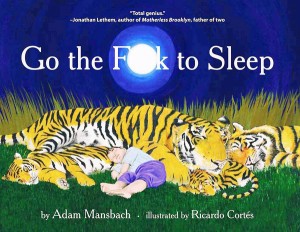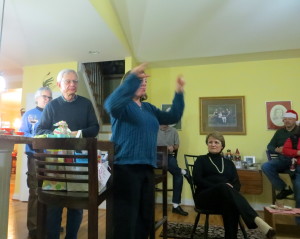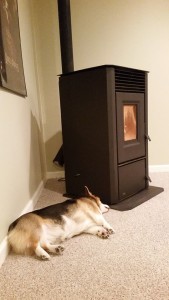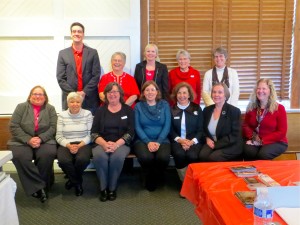Welcome to the Spot Writers. The prompt for this month centres around the theme of autumn (Halloween, crispy leaves, Thanksgiving, a chill in the air, the smell of smoke in the wind—even early Christmas sales). This week’s contribution comes from Cathy MacKenzie.
Cathy’s latest children’s picture book, BAD, BAD GRANNY, is now available on Amazon, in print (in two sizes: 6×9 and 8×10) or e-book. Volume 4 of Cathy’s “Creepy Christmas” series of books, CREEPY CHEERY CHRISTMAS, has just been published. In fact, Cathy’s post this month is a story from that book titled, “Crows and Storks.” The book is available for purchase here, either on Amazon (print or e-book) or on Smashwords (e-book). Be forewarned, however. These “creepy Christmas” stories, depending upon your point of view, are either weird and wacky, crass and crude, humourous and sarcastic—or just plain silly!
***
Crows and Storks
by Cathy MacKenzie
“Let’s go shopping tonight, Bob.”
“Nah, I’m too tired.”
“Oh pooh, you’re just lazy. All you ever want to do is lounge around and drink beer in front of the TV.”
Bob’s eyes lit up. “Sounds like fun to me.”
“Come on, I want to shop, and I’d like some company. Maybe we could do a quick dinner out. Maybe take in a movie.”
“What’s all this? First you said shopping, now you’re talking dinners and movies and who knows what else.”
“Shopping, that’s it. Plus a quick, inexpensive dinner. Maybe a movie, I said. We could go to Curley’s in the mall. It’s pretty cheap.”
Bob tossed his paper to the floor and stood at attention. “Yes, ma’am. Whatever you say, ma’am. Let’s go. Onward ho. March: one, two, three.”
Elise threw up her arms. “Oh, Bob, quit being so dramatic. You’re exasperating. Forget I mentioned it.”
She stalked from the room. Seemed she’d been doing a lot of stalking from rooms lately.
Bob grinned. He never had any trouble exasperating his wife.
“Hey, Elise, okay, let’s go.” His voice boomed from the living room. “I can show you a few items I might like for Christmas.” He figured that was part of her plan, and two could play her game.
***
Bob parked the car in the mall parking lot, several spaces away from the nearest vehicle, which was his habit in case an inexperienced teenager or a foolish woman decided it would be a pleasant experience to gouge the side of his car.
Elise, like always, had removed her seatbelt before he had turned off the engine and had zoomed off like a speeding bullet toward the entrance.
“Sir, sir,” a voice bellowed.
Bob turned to see a woman hanging from the window of a passing truck. “Sir, you’re parked over the yellow line.”
His head swiveled again. “What?”
Elise, who had heard a commotion, turned to watch.
“What?” Bob repeated.
The woman pointed at his car. “You’re parked over the line. You’re taking more space than you should. It’ll be hard for another car to park beside you.”
Still confused, Bob looked back at his vehicle. “What the hell you yapping about?”
“Hey, buster, don’t talk to me like that,” the woman shouted. “I have a citizen’s right to report bozos like you who think the world owes them.”
By that time, Elise had returned to Bob’s side. “What’s wrong?”
Bob sighed. “Nothing, Elise. Go wait inside the mall while I move the car.”
Elise’s face lit up like an illuminated light bulb. “Oh, okay.” She made a face at the rear of the white truck when it pulled away. She would have flipped her finger but knew the woman wouldn’t see. And she didn’t want to exert herself unnecessarily; she needed to save her strength for shopping. And for dealing with her ornery husband.
What a weak sap he was. No gumption at all. What man listened to a stranger in a parking lot anyhow? But he’d make some excuse.
Elise entered the mall and stood by the double doors waiting for her husband. Where was the woman who had rudely admonished her husband? Would she pass by without Elise noticing her? Come to think of it, she hadn’t gotten a good look at the person and wouldn’t recognize her if the woman fainted dead beside her. After further thought, she wished she had a voodoo doll, so she could pin the thing to death. Make that woman keel over before she even alighted from the truck. No, that wouldn’t work. The raging woman would be halfway to the mall by this time, maybe even in the mall. Maybe even toting a few bags of purchases.
Elise reconsidered. No. No woman—not even Elise—could shop that fast.
She scanned the parking lot again. Where was he? And then she spied him, sauntering in between vehicles. She prayed he hadn’t gotten into a confrontation with the woman. It wouldn’t do for the cops to arrive, not when she had finally succeeded in getting him out for an evening. Not so much getting him out, but getting herself out. Jimmy had gone to a schoolmate’s for an overnighter, so it was the perfect opportunity for them to go without carting the brat around. For some reason, as yet unfathomable to her, she had desired Bob’s company.
As Bob neared, she tried to glean from his expression whether he was in a good mood. Was their night ruined? Her stomach growled. She pictured Curley’s famous wings piled high before Bob. Why had she pictured Bob’s meal and not hers?
From a distance, he looked okay though his mouth was in his perpetual pout.
She held the door open for him. Why? The doors were all automatic today. Technology. What happened to heavy doors allowing gentlemen to show off for their women?
“You okay?” she asked when he reached her.
“Sure, fine and dandy.”
Elise shook her head. “The nerve of her. What kind of woman does that?” Elise neglected to ask why he’d listen to a strange woman in a parking lot.
“Yeah, yeah, why did I listen to her? I see the question spinning in your brain.”
“Really? It shows that much?”
“Yep, afraid so.
“Hmmm.” When he didn’t say anything else, she asked, “You gonna answer or keep me in the dark like you always do?” As soon as her words were out, she regretted them. She didn’t want to antagonize her husband. She was starving and wanted dinner.
Bob grunted.
“Well, why would you obey a total stranger? And one in a parking lot, one you’ll never see again. You never listen to me, and I’m your wife.” Out of breath, Elise stopped. Had she gone too far?
“You done?”
“Bob, I can’t believe you would do that to me!”
“Do what?”
“Bob, you cheated on me.” Elise’s eyes glistened. “As if you had snuck out in the middle of the night to meet someone, you surely cheated on me.”
“Elise, what the hell you talking about?”
“Cheating, Bob. Cheating. You listened to—no, obeyed—another woman. You immediately did as she had asked. A total stranger! You don’t even listen to me, and I’m your wife. Your wife! Aren’t I your wife? Don’t I mean more to you than some floozy in a parking lot? I’m stunned. Just stunned. Then again, what did I expect from you, right?”
And then the visions began. Black blobs swirled before her like the floaters that had suddenly appeared in her eyes months previously. She had rushed to the emergency room, where the doctors, worried she had a detached retina or worse, performed various tests on her. But no, just floaters: black thingies attacking her like 3-D objects in movies. She had been petrified at the time but gradually adjusted to the black dots and soon they became less prominent, had even disappeared. Had the ghastly invading floaters returned? Should she worry again?
No, they weren’t floaters. They just looked like floaters. They were crows. Black crows that bubbled up before her.
Despite the sight, her mouth salivated. Her stomach growled. She literally saw the window opening, by Bob’s strong arms of course—he always ruined everything—and watched plates of food carried out by crows. She’d dream of that scene later; she was sure of it.
The plates must be held up by invisible twine, for how else could crows cart them from the table? And then the dirty dark crows transformed into white storks wearing wee pink dunce caps and toting corners of blankets in their beaks. The blankets shrouded babies, protecting them, nurturing them—all except her Angel, of course, who’d been taken from a good and real stork, probably by one of those crazy crows.
One monstrous crow-stork continued to soar around with an empty blanket that had once shrouded her dear, sweet Angel. Elise was positive that was the dastardly crow that had stolen her baby.
As if she were expecting her menstrual cycle, Elise sobbed. Great wracking sobs from the bottom of her soul where lay hidden her memories of her Angel.
Those stupid storks. Why had they floated up before her? It was the crazy crows that started it. Those stupid floaters.
“Elise, what’s your problem? I moved the car. That was it.”
She ignored her husband. She wished the storks were real, at least the one carrying the empty baby blanket. She longed to grab the blanket that once had held her child, the infant who had been taken too soon, the infant who hadn’t had a chance to enjoy life like other people. But life wasn’t fair, was it?
And if she could’ve snatched that soft flannel blanket, she’d caress it against her cheek and inhale the scent of her long-lost child. She sobbed again. Granted, she hadn’t thought of her dead baby for who knows how long, but the infant’s presence was always there, somewhere, even if Elise didn’t consciously think of her.
“Come on, woman, I can’t believe you’d accuse me of having an affair just because some female conversed with me in the parking lot. I was just trying to protect my car. How would you feel if we came out of the mall to find my car keyed? How’d you like that, huh?”
“Your car, Bob? I thought it was OUR car.”
“Elise, stay on the topic at hand. Listen. To. Me. I moved the car to protect it. I listened to that woman ‘cause she was a looney toon. I feared for my—our—car’s safety.”
“Really, that’s why you did what she asked? You weren’t cheating on me?”
“Please, Elise. Give me more credit than that. A parking lot isn’t the place to cheat.”
Elise pondered his comments. So much swirled through her head. Crazy crows and filthy floaters. Storks wearing dunce caps. Pink flannel receiving blankets waving in the warm summer breeze. Her Angel. Her dinner ruined because of another woman. She sobbed again.
“Elise, stop. Right now.”
Elise grabbed a tissue from her sleeve. “You weren’t cheating on me? Promise?”
Bob grunted and then sighed. “Elise, if it’ll make you feel better, I cross my heart and hope to die. I promise. I swear.”
“But, Bob, I don’t want you to die. Whatever would I do without you?”
“Christ, Elise. That’s a discussion for another night. Stay on the topic at hand!”
She looked up at him, snot sliding into her mouth, tears pouring down her cheeks again. “You still going to take me out to dinner?”
“I said I would, didn’t I? Don’t I always live up to my promises?”
She wiped her nose. “Stay on the topic at hand, Bob.”
It was Bob’s turn to flail his arms. “I give up.”
Elise wiggled her fingers. “Dinner? No, I can’t eat now. Storks have taken it. No, it was the crows that took dinner. The storks took Angel, at least one did. Those stupid, stupid storks. Those dirty, dirty crows.” Elise thought she had mumbled her words. Or had she simply thought them?
“Elise, woman, what you talking about? I can’t make heads nor tails. Storks? Crows? What the heck—”
“No, my dinner is gone.” Elise looked at her husband, stared him straight in the eyes but didn’t really see him, looking through him as if he were invisible, a sort of wispy ghost that floated in and out, as if smoke had sucked him up. No, she didn’t see him. He was gone, just like Angel was gone. Just like dinner.
Gone!
Bob grasped her by the shoulders and shook her like a rag doll. She shuddered when he dropped his hands.
“Elise, snap out of it.”
She looked at him again, this time seeing her husband. Really viewing him. Her hands rubbed her growling stomach. She hoped she wouldn’t throw up.
“My appetite’s gone, Bob. Just gone.” Just like Angel. Just like dinner. “I wanna go home.”
Bob shook his head. Women! He’d never understand them. Never. Two foolish women in one day. Being accused of infidelity, which he wouldn’t have minded had it been true, which it wasn’t, of course. Like he’d told Elise, who’d have an affair in a parking lot? And with a woman like that! No, not him.
“Come on, woman, let’s eat. This evening was your idea. I came all this way, just for you, and put up with the wrath of that driver.” Bob stopped short of complaining about Elise’s actions, which were more disturbing to him. But in the end, what did he expect? Elise was his wife, and sometimes she wasn’t all there.
“No, Bob. I’m not hungry anymore. I just wanna go home.”
Elise’s stomach growled. Bob heard it.
***
The Spot Writers—Our Members:
RC Bonitz: http://www.rcbonitz.com
Val Muller: https://valmuller.com/blog/
Catherine A. MacKenzie: https://writingwicket.wordpress.com/wicker-chitter/
Tom Robson: website in progress



 Freedom is an important cause for me. I believe that with freedom, our potential for accomplishment becomes limitless. I’ve edited several anthologies with Freedom Forge Press on the topic of freedom, including both fiction and nonfiction stories about people striving to find freedom and celebrating the spirit of the individual.
Freedom is an important cause for me. I believe that with freedom, our potential for accomplishment becomes limitless. I’ve edited several anthologies with Freedom Forge Press on the topic of freedom, including both fiction and nonfiction stories about people striving to find freedom and celebrating the spirit of the individual.





